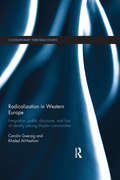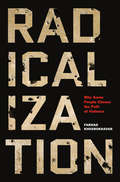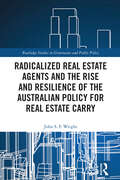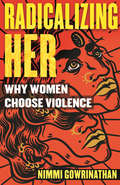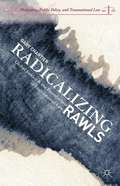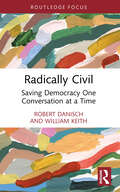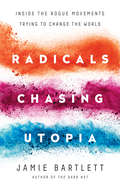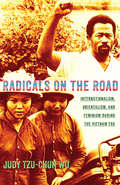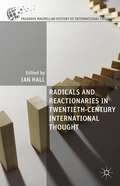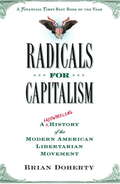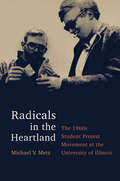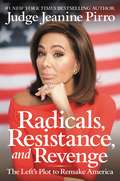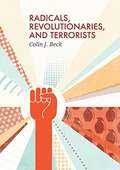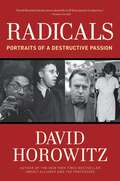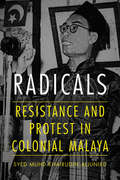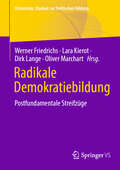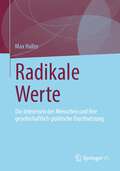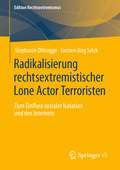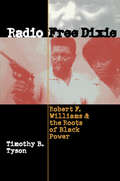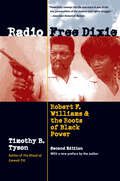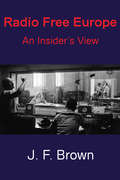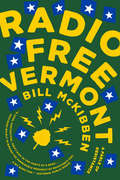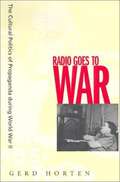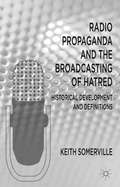- Table View
- List View
Radicalization in Western Europe: Integration, Public Discourse and Loss of Identity among Muslim Communities (Contemporary Terrorism Studies)
by Carolin Görzig Khaled Al-HashimiEmploying a theoretical framework based on the concept of identity loss, this book seeks to understand why increased integration has stimulated greater radicalization among the Muslim populations in Western Europe. Through extensive field research in four European countries – the UK, the Netherlands, Germany and France – the authors investigate three key questions: 1) Why are 2nd and 3rd generations of Muslims in Europe more radical than their parents?; 2) Why does Europe experience more "home-grown terrorism" today than thirty or forty years ago?; 3) Why do some European countries feature more radical Muslim communities than others? The book reveals that these three puzzling questions can be solved when analyzing the loss of individuality if the face of integration and identification with European society. While Individualist and structural approaches fail to explain radicalization of Muslims in Europe, this study, by framing radicalization through coupling the public discourse with identity loss, provides a much needed insight into the process of radicalization. Explaining radicalization and gaining an understanding of the drivers of radicalization is crucial to prevent and mitigate intercultural alienation, to further develop immigration policies, redress integration failures as well as to avoid dangerous oversimplifications. This book contributes not only to understanding why greater integration is matched by increasing radicalization, but its insights also contribute to developing ideas about how radicalization can be prevented or overcome and integration policies can be enhanced. This book will be of much interest to students of terrorism and counter-terrorism, radical Islam, war and conflict studies, European politics, IR and security studies.
Radicalization: Why Some People Choose the Path of Violence
by Jane Marie Todd Farhad KhosrokhavarIn the wake of the Paris, Beirut, and San Bernardino terrorist attacks, fears over "homegrown terrorism" have surfaced to a degree not seen since September 11, 2001--especially following the news that all of the perpetrators in Paris were European citizens. A sought-after commentator in France and a widely respected international scholar of radical Islam, Farhad Khosrokhavar has spent years studying the path towards radicalization, focusing particularly on the key role of prisons--based on interviews with dozens of Islamic radicals--as incubators of a particular brand of outrage that has yielded so many attacks over the past decade.Khosrokhavar argues that the root problem of radicalization is not a particular ideology but rather a set of steps that young men and women follow, steps he distills clearly in this deeply researched account, one that spans both Europe and the United States. With insights that apply equally to far-right terrorists and Islamic radicals, Khosrokhavar argues that our security-focused solutions are pruning the branches rather than attacking the roots--which lie in the breakdown of social institutions, the expansion of prisons, and the rise of joblessness, which create disaffected communities with a sharp sense of grievance against the mainstream.
Radicalized Real Estate Agents and the Rise and Resilience of the Australian Policy for Real Estate Carry (Routledge Studies in Governance and Public Policy)
by John S. WrightThis is a book about policy change that focusses on a single case study: the rise and resilience of the Australian policy for Real Estate Carry. The text tracks investments of meaning and identity in the Australian policies for Negative Gearing (1987) and the Capital Gains Tax Discount (1999), through which successive federal governments inadvertently created scope for a dangerous and inefficient Real Estate Carry Trade in the housing sector that has proven resilient to reform for a quarter century. Considering that Carry Trades inevitably create the conditions for their own collapse, the historical failure of Australian governments to achieve policy change is a serious issue for the country going forward. As they attempt to make their housing sector more stable, sustainable and equitable, Australian people may need to prepare for potentially dramatic changes to their economic and monetary system. The book also raises important implications for understanding the nature and workings of policy change in Australian politics and beyond. It is a valuable resource for scholars and students of political theory, public policy and Australian politics as well as policy practitioners, third sector groups and political parties interested in Australian and international housing policy.
Radicalizing Her: Why Women Choose Violence
by Nimmi GowrinathanAn urgent corrective to the erasure of the female fighter from narratives on gender and power, demanding that we see all women as political actors."Violence, for me, and for the women I chronicle in this book, is simply a political reality."Though the female fighter is often seen as an anomaly, women make up nearly 30% of militant movements worldwide. Historically, these women--viewed as victims, weak-willed wives, and prey to Stockholm Syndrome--have been deeply misunderstood. Radicalizing Her holds the female fighter up in all her complexity as a kind of mirror to contemporary conversations on gender, violence, and power. The narratives at the heart of the book are centered in the Global South, and extend to a criticism of the West's response to the female fighter, revealing the arrayed forces that have driven women into battle and the personal and political elements of these decisions.Gowrinathan, whose own family history is intertwined with resistance, spent nearly twenty years in conversation with female fighters in Sri Lanka, Eritrea, Pakistan, and Colombia. The intensity of these interactions consistently unsettled her assumptions about violence, re-positioning how these women were positioned in relation to power. Gowrinathan posits that the erasure of the female fighter from narratives on gender and power is not only dangerous but also, anti-feminist.She argues for a deeper, more nuanced understanding of women who choose violence noting in particular the tendency of contemporary political discourse to parse the world into for--and against--camps: an understanding of motivations to fight is read as condoning violence, and oppressive agendas are given the upper hand by the moral imperative to condemn it. Coming at a political moment that demands an urgent re-imagining of the possibilities for women to resist, Radicalizing Her reclaims women's roles in political struggles on the battlefield and in the streets.
Radicalizing Rawls: Global Justice and the Foundations of International Law
by Gary ChartierThis book is a critical examination of John Rawls's account of the normative grounds of international law, arguing that Rawls unjustifiably treats groups - rather than particular persons - as foundational to his model of international justice.
Radically Civil: Saving Democracy One Conversation at a Time (Routledge Research in Political Communication)
by William Keith Robert DanischIf you feel like the world has gone to hell in a handbasket, you’re not alone. If you often feel there’s nothing you can do about it, you’re also not alone. Along with this increasing anger, fear, and frustration, much confusion still prevails on the appropriate communication practices for responding to difficult situations and improving our lives. Communication experts, Robert Danisch and William Keith, explain why and how we can practice radical civility in this practical guide to everyday “political” communication. This guide begins with examples of radical civility to show the potential of this kind of communication to change minds and bridge differences. The authors then unpack the three foundational principles of radical civility as useful theoretical tools for thinking throughout interactions with others in civic spaces. This is then followed by a three-step process for practicing radical civility drawing on research into active listening and its importance for creating connections, validating other views, and opening up possibilities for future conversation. The guide concludes with evidence-based communication practices and prescriptive recommendations for how to do each and show examples of each in action. Radically Civil: Saving Democracy One Conversation at a Time is a much-needed communication-based antidote to polarization, preparing students, researchers, and community leaders to be responsible participants in today’s society.
Radicals Chasing Utopia: Inside the Rogue Movements Trying to Change the World
by Jamie Bartlett"It's the hubris of every generation to think that they have arrived at the best way of living. But all the things we now take for granted, all the modern wisdoms we hold to be self-evident, were once derided as dangerous or foolish radical thinking."-From the PrologueIn Radicals Chasing Utopia, Jamie Bartlett, one of the world's leading thinkers on radical politics and technology, takes readers inside the strange and exciting worlds of the innovators, disrupters, idealists, and extremists who think we can do better-and believe they know how. Bartlett introduces us to some of the most influential movements today: techno-futurists questing for immortality, far-right groups seeking to close borders, militant environmentalists striving to save the planet by any means necessary, and psychedelic pioneers attempting to heal society with the help of powerful hallucinogens.The success of democratic societies hinges on our ability to listen to-and in some cases learn from-the radical movements in our midst. Their methods may be extreme, but in chasing utopia, these groups are challenging what is possible and previewing the world to come.
Radicals On The Road: Internationalism, Orientalism, and Feminism during the Vietnam Era (The United States in the World)
by Judy Tzu-Chun WuTraveling to Hanoi during the U. S. war in Vietnam was a long and dangerous undertaking. Even though a neutral commission operated the flights, the possibility of being shot down by bombers in the air and antiaircraft guns on the ground was very real. American travelers recalled landing in blackout conditions, without lights even for the runway, and upon their arrival seeking refuge immediately in bomb shelters. Despite these dangers, they felt compelled to journey to a land at war with their own country, believing that these efforts could change the political imaginaries of other members of the American citizenry and even alter U. S. policies in Southeast Asia. In Radicals on the Road, Judy Tzu-Chun Wu tells the story of international journeys made by significant yet underrecognized historical figures such as African American leaders Robert Browne, Eldridge Cleaver, and Elaine Brown; Asian American radicals Alex Hing and Pat Sumi; Chicana activist Betita Martinez; as well as women's peace and liberation advocates Cora Weiss and Charlotte Bunch. These men and women of varying ages, races, sexual identities, class backgrounds, and religious faiths held diverse political views. Nevertheless, they all believed that the U. S. war in Vietnam was immoral and unjustified. In times of military conflict, heightened nationalism is the norm. Powerful institutions, like the government and the media, work together to promote a culture of hyperpatriotism. Some Americans, though, questioned their expected obligations and instead imagined themselves as "internationalists," as members of communities that transcended national boundaries. Their Asian political collaborators, who included Buddhist monk Thich Nhat Hanh, Foreign Minister of the Provisional Revolutionary Government Nguyen Thi Binh and the Vietnam Women's Union, cultivated relationships with U. S. travelers. These partners from the East and the West worked together to foster what Wu describes as a politically radical orientalist sensibility. By focusing on the travels of individuals who saw themselves as part of an international community of antiwar activists, Wu analyzes how actual interactions among people from several nations inspired transnational identities and multiracial coalitions and challenged the political commitments and personal relationships of individual activists.
Radicals and Reactionaries in Twentieth-Century International Thought
by Ian HallThe history of international thought is a burgeoning field in International Relations, but so far it has mainly concentrated on the work of American and British "realists" and "idealists. " This book breaks new ground, moving beyond Anglophone thinkers and the mainstream traditions to examine the work of radicals and reactionaries from across the world. It includes original chapters on German conservatives and Italian socialists, Labour Party radicals and French fascists, as well as Italianand Japanese imperialists and Indian anti-colonialists. It explores the transnational transmission of theories and traditions of international thought, as well as their reception, adaptation, and rejection by thinkers across Europe and Asia during the course of the twentieth century.
Radicals for Capitalism: A Freewheeling History of the Modern American Libertarian Movement
by Brian DohertyOn Wall Street, in the culture of high tech, in American government: Libertarianism-the simple but radical idea that the only purpose of government is to protect its citizens and their property against direct violence and threat- has become an extremely influential strain of thought. But while many books talk about libertarian ideas, none until now has explored the history of this uniquely American movement-where and who it came from, how it evolved, and what impact it has had on our country. In this revelatory book, based on original research and interviews with more than 100 key sources, Brian Doherty traces the evolution of the movement through the unconventional life stories of its most influential leaders- Ludwig von Mises, F. A. Hayek, Ayn Rand, Murray Rothbard, and Milton Friedman-and through the personal battles, character flaws, love affairs, and historical events that altered its course. And by doing so, he provides a fascinating new perspective on American history-from the New Deal through the culture wars of the 1960s to today's most divisive political issues. Neither an exposé nor a political polemic, this entertaining historical narrative will enlighten anyone interested in American politics.
Radicals in the Heartland: The 1960s Student Protest Movement at the University of Illinois
by Michael V. MetzIn 1969, the campus tumult that defined the Sixties reached a flash point at the University of Illinois. Out-of-town radicals preached armed revolution. Students took to the streets and fought police and National Guardsmen. Firebombs were planted in lecture halls while explosions rocked a federal building on one side of town and a recruiting office on the other. Across the state, the powers-that-be expressed shock that such events could take place at Illinois's esteemed, conservative, flagship university--how could it happen here, of all places? Positioning the events in the context of their time, Michael V. Metz delves into the lives and actions of activists at the center of the drama. A participant himself, Metz draws on interviews, archives, and newspaper records to show a movement born in demands for free speech, inspired by a movement for civil rights, and driven to the edge by a seemingly never-ending war. If the sudden burst of irrational violence baffled parents, administrators, and legislators, it seemed inevitable to students after years of official intransigence and disregard. Metz portrays campus protesters not as angry, militant extremists but as youthful citizens deeply engaged with grave moral issues, embodying the idealism, naiveté, and courage of a minority of a generation.
Radicals, Resistance, and Revenge: The Left's Plot to Remake America
by Jeanine PirroPicking up where her #1 New York Times bestseller, Liars, Leakers and Liberals, left off, Judge Jeanine Pirro of Fox's Justice with Judge Jeanine exposes the latest chapter in the unfolding liberal attack on our most basic values. <P><P><b> A New York Times Bestseller </b>
Radicals, Revolutionaries, and Terrorists (Social Movements Series)
by Colin J. BeckTerrorism, mass uprisings, and political extremism are in the news every day. It is no coincidence that these phenomena come together at the beginning of a new era. Radicals, Revolutionaries, and Terrorists provides a comprehensive survey of the intersection of radical social movements and political violence. The book considers eight essential questions for understanding radicalism, including its origins, dynamics, and outcomes. Ranging across the globe from the 1500s to the present, the book examines cases as diverse as nineteenth-century anarchists, the Nazis, Che Guevara, the Weather Underground, Chechen insurgents, the Earth Liberation Front, Al-Qaeda, and the Arab Spring. Throughout, Colin J. Beck connects these cases to key social movements literature to demonstrate how using multiple areas of research results in better explanations. Radicals, Revolutionaries, and Terrorists is an essential companion for understanding the challenges facing governments and societies today. Its engaging style and original approach make it indispensable for students and scholars across the social sciences who are interested in social movements.
Radicals: Portraits of a Destructive Passion
by David HorowitzRadical liberals want to make America a better place, but their utopian social engineering leads, ironically, to greater human suffering. So argues David Horowitz, bestselling author in his newest book Radicals: Portraits of a Destructive Passion.From Karl Marx to Barack Obama, Horowitz shows how the idealistic impulse to make the world "a better place" gives birth to the twin cultural pathologies of cynicism and nihilism, and is the chief source of human suffering. A former liberal himself, Horowitz recounts his own brushes with radicalism and offers unparalleled insight into the disjointed ideology of liberal elites through case studies of well-known radial leftists, including Christopher Hitchens, feminist Bettina Aptheker , leftist academic Cornel West, and more.Exploring the origin and evolution of radical liberals and their progressive ideology, Radicals illustrates how liberalism is not only intellectually crippling for its adherents, but devastating to society.
Radicals: Resistance and Protest in Colonial Malaya
by Syed AljuniedRadicals tells the story of a group of radical Malay men and women from ordinary social backgrounds who chose to oppose foreign rule of their homeland, knowing full well that by embarking on this path of resistance, they would risk imprisonment or death. Their ranks included teachers, journalists, intellectuals, housewives, peasants, preachers, and youths. They formed, led, and contributed to the founding of political parties, grassroots organizations, unions, newspapers, periodicals, and schools that spread their ideas across the country in the aftermath of the Great Depression, when colonialism was at its height and evident in all areas of life in their country. But when their efforts to uproot foreign dominance faltered in the face of the sanctions the state imposed upon them, some of these radicals chose to take up arms, while others engaged in aggressive protests and acts of civil disobedience to uphold their rights. While some died fighting and hundreds were incarcerated, many lived to resist colonialism until their country attained its independence in August 1957, all of these Malay radicals were devoted to becoming free men and women and to claiming their right to be treated as equals in a world riddled with prejudice and contradictions. Syed Muhd Khairudin Aljunied's innovative study brings to light the less charted and unanalyzed terrain of the radical experience—becoming and being radical. He argues that the experiences and histories of radicals in colonial Malaya can be elucidated in a more nuanced way by interrogating them alongside evolving local and global circumstances and by analyzing them through the lenses of a set of overarching and interconnected mobilizing concepts—a set of ideas, visions, and notions that the radicals used to reason and justify their advent—that were internalized, lived, and utilized in the course of their activism. These mobilizing concepts were their weapons and armor, employed to organize, strategize, protect, and consolidate themselves when menaced by the tentacles of the colonial state as they embarked upon the agonizing path towards independence. Those interested in Malaysian history, colonial history, radical movements, and resistance groups will enjoy this fascinating study.
Radikale Demokratiebildung: Postfundamentale Streifzüge (Citizenship. Studien zur Politischen Bildung)
by Dirk Lange Oliver Marchart Werner Friedrichs Lara KierotDie Kulmination von Krisen zu Beginn des 3. Jahrtausends – Klimakrise, Verteilungskrise, Gesundheitskrise, Ernährungskrise, Trinkwasserkrise, Finanzkrise etc. – macht es unmöglich, unsere Situation ausschließlich in Figurationen lokaler oder zeitlich abgrenzbarer Probleme oder Herausforderungen zu erfassen, sondern wirft fundamentale Fragen auf. Allen voran die Frage, in welcher Welt wir zukünftig leben wollen. Für die demokratische Praxis, wie auch für demokratisches Denken, erwächst daraus eine kaum zu überschätzende Aufgabe: Die Reformulierung des Rahmens eines gemeinsamen, demokratischen Erfahrungshorizontes, eines demokratischen, (mit-)geteilten Weltzugangs. Dabei zeigt sich, dass vor allem die Blaupausen liberaler Demokratieansätze selbst in eine Krise geraten sind und ihre Orientierungskraft eingebüßt haben. In diesem Sammelband wird eine offene Suche einer Konzeption Radikaler Demokratiebildung gesucht, mit der es möglich werden könnte, den Herausforderungen der Gegenwart zu begegnen.
Radikale Werte: Die Interessen der Menschen und ihre gesellschaftlich-politische Durchsetzung
by Max HallerEin berühmter, immer wieder zitierter Satz von Max lautet: „Interessen (materielle und ideelle), nicht: Ideen, beherrschen unmittelbar das Handeln der Menschen. Aber: die ‚Weltbilder‘, welche durch ‚Ideen‘ geschaffen wurden, haben sehr oft als Weichensteller die Bahnen bestimmt, in denen die Dynamik der Interessen das Handeln fortbewegte.“ Die neuere Soziologie ist diesem Grundsatz allerdings nicht gerecht geworden. Werte und ihre Wirkung werden entweder als gegeben vorausgesetzt (so bei Talcott Parsons) oder überhaupt als irrelevant betrachtet (so in der Rational Choice- und Systemtheorie). Die umfangreiche, empirische Werteforschung hat vielfältige Ergebnisse erbracht, blieb jedoch weitgehend ohne theoretisches Fundament, sodass ihre Befunde vielfach anfechtbar sind. Weber selbst gab im Hinblick auf die Frage nach der Relevanz der Werte nur unbefriedigende Antworten: Die Entscheidung für bestimmte Werte sei eine rein individuelle Angelegenheit und zwischen den verschiedenenWerten gebe es einen unversöhnlichen Kampf. Im vorliegenden Buch wird diese Problematik erstmals in der deutschen Soziologie umfassend untersucht und es wird dafür (u.a. im Anschluss an Autoren wie Immanuel Kant, George H. Mead und Raymond Boudon), eine neue, konstruktive und erklärungsstarke Lösung gefunden. Unter Zuhilfenahme von Überlegungen aus Philosophie, Sozialtheorie und empirischer Sozialforschung sowie unter Einbeziehung historischer Kämpfe zur Anerkennung und Durchsetzung der Werte kann man feststellen, dass es gesellschaftliche Grundwerte gibt, dass deren Anzahl klar bestimmbar ist und dass zwischen ihnen keineswegs Konflikt, sondern Komplementarität besteht. Mit diesen Thesen und Befunden kann dieses Buch als neues soziologisches Standardwerk angesehen werden. Es hat auch für Vertreter vieler anderer geistes- und sozialwissenschaftlicher Disziplinen grundlegende Bedeutung.
Radikalisierung rechtsextremistischer Lone Actor Terroristen: Zum Einfluss sozialer Isolation und des Internets (Edition Rechtsextremismus)
by Stephanie Ohlrogge Torsten Jörg SelckÜber den Einfluss sozialer Isolation und des Internets auf die Radikalisierung von rechtsextremistischen Lone Actor Terroristen liegen bislang kaum theoretische und empirische Erkenntnisse vor, sodass die Untersuchung an dieser Forschungslücke anknüpft. Auf Basis einer vergleichenden Fallstudie werden praxisnah neue theoretische Erkenntnisse über die Wirkmechanismen der beiden Radikalisierungsfaktoren gewonnen. Insbesondere Online-Plattformen mit radikalen Communities spielen eine zentrale Rolle und können sowohl bei sozial isolierten als auch bei integrierten Einzeltätern gruppenbasierte Radikalisierungsprozesse initiieren.
Radio Free Dixie
by Timothy B. TysonThis book tells the remarkable story of Robert F. Williams--one of the most influential black activists of the generation that toppled Jim Crow and forever altered the arc of American history. In the late 1950s, as president of the Monroe, North Carolina, branch of the NAACP, Williams and his followers used machine guns, dynamite, and Molotov cocktails to confront Klan terrorists. Advocating "armed self-reliance" by blacks, Williams challenged not only white supremacists but also Martin Luther King Jr. and the civil rights establishment. Forced to flee during the 1960s to Cuba--where he broadcast "Radio Free Dixie," a program of black politics and music that could be heard as far away as Los Angeles and New York City--and then China, Williams remained a controversial figure for the rest of his life. Historians have customarily portrayed the civil rights movement as a nonviolent call on America's conscience--and the subsequent rise of Black Power as a violent repudiation of the civil rights dream. But Radio Free Dixie reveals that both movements grew out of the same soil, confronted the same predicaments, and reflected the same quest for African American freedom. As Robert Williams's story demonstrates, independent black political action, black cultural pride, and armed self-reliance operated in the South in tension and in tandem with legal efforts and nonviolent protest."Stunning. . . . Radio Free Dixie presents an engaging portrait of one man's continuous struggle to resist political and social oppression."--Emerge"[A] radiant biography. . . . Tyson is that rarest of writers: a successful scholar who can actually tell a compelling story in clear, even handsome language."--Village Voice Literary Supplement"Tyson's firecracker text crackles with brilliant and lasting images of black life . . . across the South in the '40s, '50s and '60s. . . . Tyson successfully portrays Williams as a troubled visionary, a strong, stubborn and imperfect man, one who greatly influenced what became the Black Power Movement and its young leaders."--Publishers WeeklyThis book tells the riveting story of controversial black activist Robert F. Williams (1925-1996). In the late 1950s, as president of the Monroe, North Carolina, NAACP, Williams organized armed resistance to KKK terrorists--in the process challenging not only white supremacists but also Martin Luther King Jr. and the civil rights establishment. As Radio Free Dixie reveals, however, the civil rights movement and the Black Power movement grew out of the same soil, confronted the same predicaments, and were much closer than traditional portrayals suggest. In the civil rights-era South, independent black politics, black cultural pride, and "armed self-reliance" operated in tension and in tandem with legal efforts and nonviolent protests in the quest for African American freedom. -->
Radio Free Dixie, Second Edition: Robert F. Williams and the Roots of Black Power
by Timothy B. TysonThis classic book tells the remarkable story of Robert F. Williams (1925-1996), one of the most influential black activists of the generation that toppled Jim Crow and forever altered the arc of American history. In the late 1950s, Williams, as president of the Monroe, North Carolina, branch of the NAACP, and his followers used machine guns, dynamite, and Molotov cocktails to confront Klan terrorists. Advocating "armed self-reliance," Williams challenged not only white supremacists but also Martin Luther King Jr. and the civil rights establishment. Forced to flee during the 1960s to Cuba--where he broadcast "Radio Free Dixie," a program of black politics and music that could be heard as far away as Los Angeles and New York City--and then to China, Williams remained a controversial figure for the rest of his life. Radio Free Dixie reveals that nonviolent civil rights protest and armed resistance movements grew out of the same soil, confronted the same predicaments, and reflected the same quest for African American freedom. As Robert Williams's story demonstrates, independent black political action, black cultural pride, and armed self-reliance operated in the South in tension and in tandem with legal efforts and nonviolent protest.
Radio Free Europe: An Insider's View
by J. F. BrownThe story of Radio Free Europe’s role during the Cold War, as recounted by veteran RFE official J. F. Brown, who served as director from 1978 to 1983.Jim Brown had written about Eastern Europe from RFE, but never about RFE?until he wrote this book. He conveys his understanding of how Radio Free Europe functioned as a decentralized organization that empowered exiles, while also conveying what it, and they, could?and could not?offer East European listeners. Jim Brown’s explanations of the function of the central news department as an internal news agency, of discussions with and trust of exile broadcast chiefs, of RFE’s cautious approach to broadcasting to Poland under martial law after 1981?to cite only three examples from the book?illuminate the editorial policies and internal relationships that made RFE a success. His portraits of key personalities over the years help us understand that RFE was not just an institution; it was a unique multinational group of people. (From the Foreword by A. Ross Johnson).Praise for Radio Free Europe: An Insider’s View“The historical analysis Brown brings is extremely valuable and adds the insight of a first-rate analyst to such topics as the contrast between how RFE handled the Hungarian and Polish events of the 1950s, the “Czech spring” in 1968, the Gomulka period in Poland, the developing independence of Ceausescu’s Romania, etc. All are given perceptive treatment.” —Eugene R. Parta, co-author of Cold War Broadcasting: Impact on the Soviet Union and Eastern Europe“I know of no other books on RFE by an insider who had so much experience with the Radios and how they were operated. [It is] very well written, well organized, and a fascinating read.” —Yale Richmond, cultural affairs officer, U.S. Foreign Service (ret.), author of Practicing Public Diplomacy: A Cold War Odyssey
Radio Free Vermont: A Fable of Resistance
by Bill McKibben“I hope no one secedes, but I also hope that Americans figure out creative ways to resist injustice and create communities where everybody counts. We've got a long history of resistance in Vermont and this book is testimony to that fact.” –Bernie SandersA book that's also the beginning of a movement, Bill McKibben's debut novel Radio Free Vermont follows a band of Vermont patriots who decide that their state might be better off as its own republic. As the host of Radio Free Vermont--"underground, underpowered, and underfoot"--seventy-two-year-old Vern Barclay is currently broadcasting from an "undisclosed and double-secret location." With the help of a young computer prodigy named Perry Alterson, Vern uses his radio show to advocate for a simple yet radical idea: an independent Vermont, one where the state secedes from the United States and operates under a free local economy. But for now, he and his radio show must remain untraceable, because in addition to being a lifelong Vermonter and concerned citizen, Vern Barclay is also a fugitive from the law. In Radio Free Vermont, Bill McKibben entertains and expands upon an idea that's become more popular than ever--seceding from the United States. Along with Vern and Perry, McKibben imagines an eccentric group of activists who carry out their own version of guerilla warfare, which includes dismissing local middle school children early in honor of 'Ethan Allen Day' and hijacking a Coors Light truck and replacing the stock with local brew. Witty, biting, and terrifyingly timely, Radio Free Vermont is Bill McKibben's fictional response to the burgeoning resistance movement.
Radio Goes to War: The Cultural Politics of Propaganda During World War II
by Gerd HortenAs a comprehensive and in-depth look at the role of domestic radio in the United States during the Second World War, this study demonstrates how radio broadcasting played a crucial role both in government propaganda and within the context of the broader cultural and political transformations of wartime America and argues that no medium merged entertainment, propaganda, and advertising more effectively than radio.
Radio Propaganda and the Broadcasting of Hatred
by Keith SomervilleAn exposition and analysis of the development of propaganda, focusing on how the development of radio transformed the delivery and impact of propaganda and led to the use of radio to incite hatred and violence.
